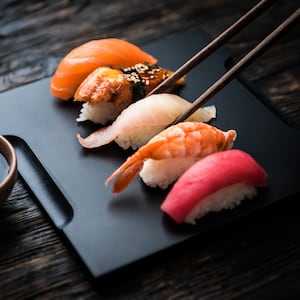Health
Discover Health Insights from Japan’s Renowned Cuisine

Japanese cuisine is increasingly recognized for its potential benefits to health and longevity. With a high life expectancy and low obesity rates, Japan offers valuable lessons on dietary habits that contribute to overall well-being. Recent research from the Japan Institute for Health Security indicates that individuals who consume traditional Japanese foods report higher levels of happiness compared to those following a Western diet.
Reiko Hashimoto, founder of Hashi Cooking, a cooking school in London, emphasizes the balance found in Japanese meals. “It’s a very balanced diet with small amounts of carbohydrates, sugar, and salt, alongside good sources of meat, fish, and vegetables,” she explains. While sushi is widely regarded as Japan’s national dish, the country boasts a diverse culinary landscape that includes dishes such as katsu pork and fresh vegetable pancakes.
Understanding the healthful aspects of the Japanese diet can provide insights into enhancing one’s own eating habits. Here are several lessons drawn from this vibrant cuisine.
Incorporate Fermented Foods
Fermented vegetables play a crucial role in Japanese diets. Foods like pickled cabbage and fermented soy products, such as miso and natto, are staples that contribute to gut health. These items are rich in probiotics, which can enhance digestion and promote a healthy microbiome.
Embrace Variety and Moderation
Japanese meals prioritize variety, which helps ensure a wide range of nutrients. Instead of large portions of a single dish, meals often consist of several smaller servings, encouraging moderation. This approach not only aids in weight management but also makes meals more enjoyable.
Hashimoto highlights the importance of these habits, stating, “I think it’s this variety, plus the habits we grow up with, which makes our diet so healthy and happy.” The emphasis on seasonal ingredients also encourages consumption of fresh produce, providing essential vitamins and minerals.
Focus on Whole Foods
The Japanese diet is characterized by whole, minimally processed foods. Staples include rice, fish, vegetables, and tofu, which are prepared in ways that preserve their natural flavors and nutrients. By reducing reliance on processed foods high in sugar and unhealthy fats, individuals can improve their overall health outcomes.
Practice Mindful Eating
Mindfulness is an integral part of Japanese culture, extending to the way meals are enjoyed. Eating slowly and savoring each bite can enhance the dining experience and lead to better digestion. This practice encourages individuals to tune into their hunger cues, potentially reducing overeating.
Stay Hydrated with Green Tea
Green tea is a prominent beverage in Japan, valued for its antioxidant properties. Regular consumption of green tea is associated with various health benefits, including improved metabolism and reduced risk of chronic diseases. Incorporating green tea into one’s daily routine can be a simple yet effective step toward better health.
Choose Fish as a Protein Source
In Japan, fish is a primary source of protein, providing essential omega-3 fatty acids that support heart health. Regular consumption of fish, particularly fatty varieties like salmon and mackerel, can contribute to a balanced diet and lower the risk of cardiovascular issues.
The insights gleaned from the Japanese diet illustrate the importance of balance, variety, and mindfulness in eating habits. By adopting these principles, individuals around the world can work towards better health and well-being.
-

 World4 months ago
World4 months agoTest Your Knowledge: Take the Herald’s Afternoon Quiz Today
-

 Sports4 months ago
Sports4 months agoPM Faces Backlash from Fans During Netball Trophy Ceremony
-

 Lifestyle4 months ago
Lifestyle4 months agoDunedin Designers Win Top Award at Hokonui Fashion Event
-

 Entertainment4 months ago
Entertainment4 months agoExperience the Excitement of ‘Chief of War’ in Oʻahu
-

 Sports4 months ago
Sports4 months agoLiam Lawson Launches New Era for Racing Bulls with Strong Start
-

 World5 months ago
World5 months agoCoalition Forms to Preserve Māori Wards in Hawke’s Bay
-

 Lifestyle4 months ago
Lifestyle4 months agoDisney Fan Reveals Dress Code Tips for Park Visitors
-

 Health4 months ago
Health4 months agoWalking Faster Offers Major Health Benefits for Older Adults
-

 Politics4 months ago
Politics4 months agoScots Rally with Humor and Music to Protest Trump’s Visit
-

 Top Stories5 months ago
Top Stories5 months agoUK and India Finalize Trade Deal to Boost Economic Ties
-

 Health2 months ago
Health2 months agoRadio Host Jay-Jay Feeney’s Partner Secures Visa to Stay in NZ
-

 World5 months ago
World5 months agoHuntly Begins Water Pipe Flushing to Resolve Brown Water Issue









